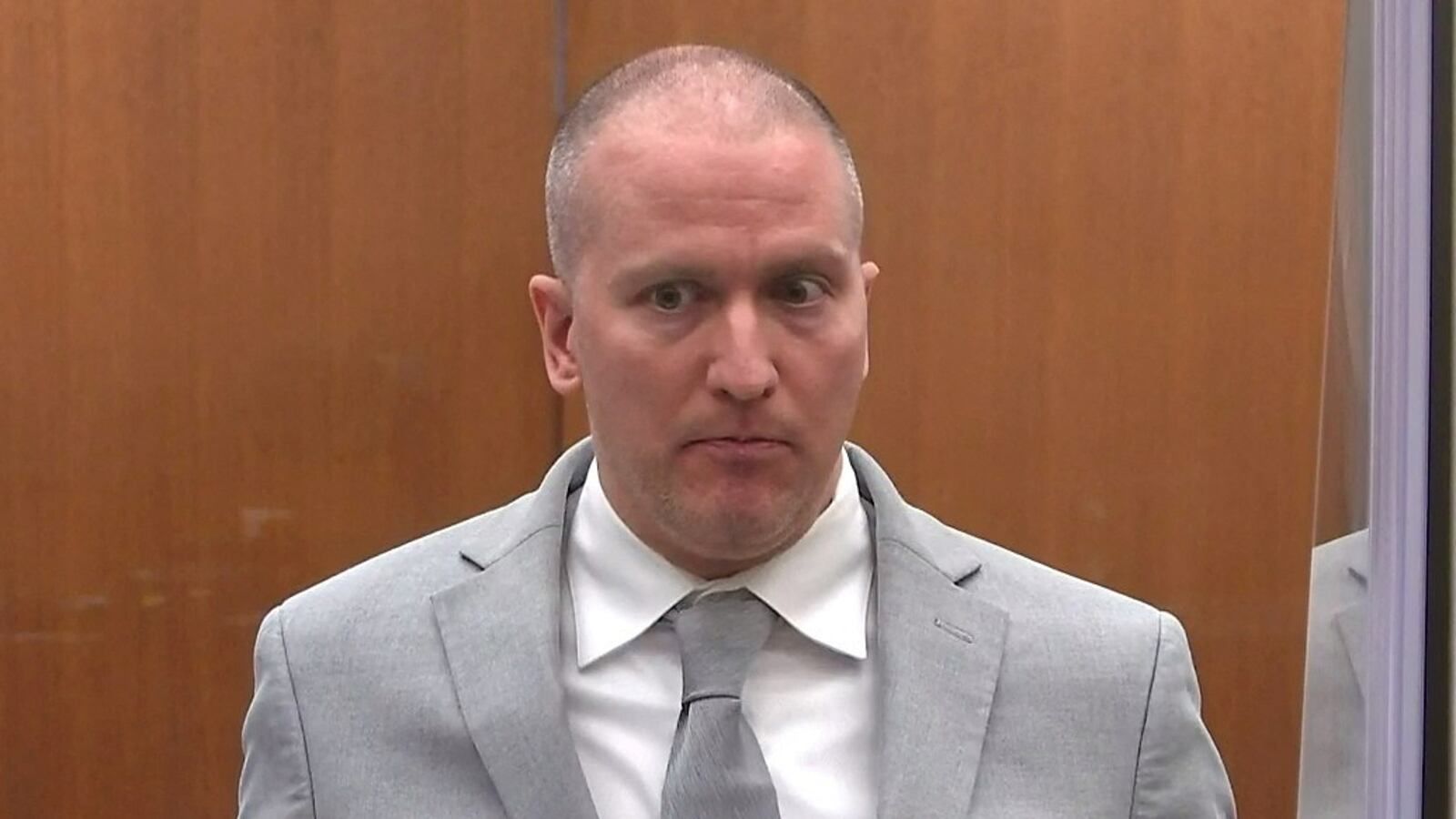Derek Chauvin, the former Minneapolis police officer already convicted of murdering George Floyd, has pleaded guilty to federal charges that he violated the 46-year-old’s civil rights when he kneeled on his neck for more than nine minutes during the notorious May 2020 incident.
Chauvin, 45, and three other former officers involved in Floyd’s death were indicted on federal charges—in addition to the state conviction that already has Chauvin serving over 20 years in prison—in May for deprivation of rights while acting as law enforcement officers. The indictment alleged the group violated Floyd’s rights to be “free from unreasonable seizure” and excessive force, and failed to provide the unarmed Black man medical care even after he cried out for help.
“The three-count indictment alleges that all four defendants, while acting under color of law, willfully deprived Mr. Floyd of his constitutional rights,” the Department of Justice said in a May press release.
The indictment, which stemmed from a Department of Justice investigation, came just weeks after Chauvin was convicted of second-degree murder, third-degree murder, and second-degree manslaughter in state court in relation to Floyd’s death.
But while Chauvin initially pleaded not guilty to the federal civil rights charges in September, the former officer amended his plea during a hearing before the U.S. District Judge Paul Magnuson at a federal courthouse in St. Paul on Wednesday. As one of the most notorious cops in American history, the guilty plea marks the latest win in Floyd’s case, which sparked a global reckoning on race and police-brutality cases.
The change of plea to the federal charges means Chauvin, who is currently being held at a prison in Oak Park Heights, Minnesota, now faces an additional 25-year sentence that will run concurrently with his current prison term. The judge ruled Wednesday that while Chauvin will be held without bond for his federal charge, he will be sentenced at a later date.
As part of his plea agreement, Chauvin pleaded guilty to two of the federal counts against him.
Chauvin will also have to pay restitution for his guilty plea and agree to never work as a law enforcement officer again. During the hearing, Chauvin indicated he understood that the guilty plea meant “this is the end of it” and he has no right to appeal this case.
The former cop also agreed with the prosecution’s assessment that during the May arrest, he held his knee on Floyd’s neck even after he was unconscious.
Notably, his three other co-defendants and former officers—Tou Thao, Thomas K. Lane, and J. Alexander Kueng—have not indicated whether they will also now change their own not-guilty pleas for the federal charges. The trio are also still waiting to face trial in March on state charges of aiding and abetting second-degree murder while committing a felony, and aiding and abetting second-degree manslaughter with culpable negligence in Floyd’s death. They have pleaded not guilty.
Attorneys for Chauvin and the three other officers involved in the case did not immediately respond to The Daily Beast’s request for comment.
In a statement to The Daily Beast, civil rights attorney Ben Crump, who is one of the attorneys representing the Floyd family, stressed that Chauvin’s decision to plead guilty was historic and shows that “significant change is afoot.”
“George Floyd was a son, a brother, and a father… who changed the world,” Crump and his co-counsel said. “We all play a role in keeping his legacy alive. We must all keep marching. We must all keep fighting against injustice. We must do this for George, to ensure that his one life and shocking death will change the future for countless others.”
According to the federal indictment against the former officers, on May 25, 2020, all four “saw George Floyd lying on the ground in clear need of medical care, and willfully failed to aid Floyd, thereby acting with deliberate indifference to a substantial risk of harm to Floyd.”
The indictment also singled out Thao and Kueng, alleging that the pair were aware that Chauvin was holding his knee on Floyd’s neck despite him being handcuffed and compliant. Thao and Kueng “willfully failed to intervene to stop Defendant Chauvin’s use of unreasonable force,” the indictment says.
In a gut-wrenching video that went viral last year, and was played several times during Chauvin’s trial on the state murder charges, Floyd could be heard begging for his mother and saying “I can’t breathe '' over two-dozen times. Several witnesses also testified during the trial that they begged the officers to release Floyd, but their cries were ignored.
The new hearing also saw Chauvin cop to a charge in a second indictment stemming from his 2017 arrest of a 14-year-old boy, in which he allegedly used a similar neck restraint.
The second indictment accused Chauvin of “willfully depriving” the boy of his civil rights after he held him “by the throat” and hit him multiple times in the head with a flashlight. Chauvin was also accused of holding his knee on the boy’s back and neck while the boy was handcuffed on the ground, the feds say.
During Wednesday’s hearing, Chauvin admitted to some details of the indictment in relation to the 2017 incident.
Last November, prosecutors asked a judge to allow them to show footage of the boy’s arrest in Chauvin’s initial murder trial, but they were denied. The footage, they said at the time, would prove an apparent pattern of violence, and was said to begin after Chauvin and another officer responded to a domestic assault call. Prosecutors said the video showed the two cops yelling at the teen, who was already on the floor, that he was under arrest, and to get up.
When the teenager refused, prosecutors told a judge, Chauvin hit him in the back of the head at least twice and grabbed him by the throat. Chauvin then allegedly put the boy in a prone position for about 17 minutes—despite pleas that he couldn’t breathe and his mom’s attempt to intervene—until paramedics arrived.







